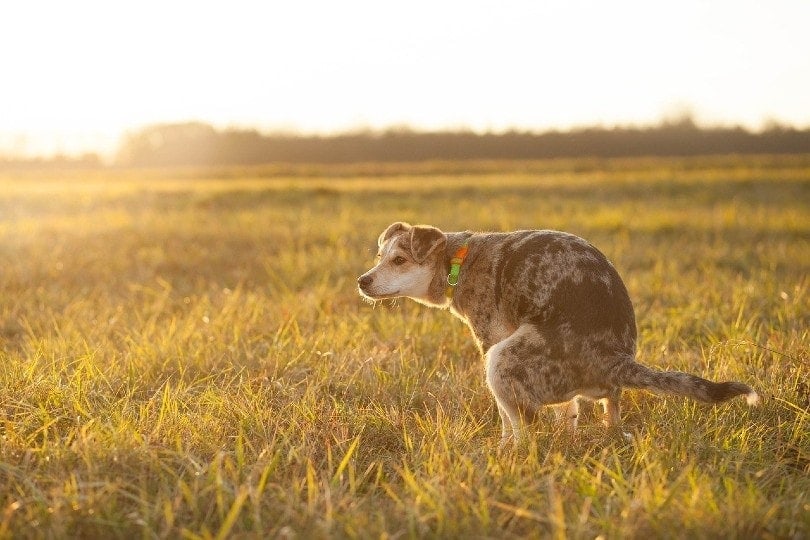White Specks in Dog Poop: Vet-Reviewed Causes & Treatments
Updated on

One thing that you probably never realized before you became a dog owner is just how much owning a pup will cause you to be interested in dog poop!
It’s true, though: If you care about your pooch, you want to keep close tabs on their health, and there’s no better way to do that than by monitoring the color and consistency of their bowel movements. Doing this will subject you to interesting sights, however.
One of these potential sights is white specks in the poop. What does this mean? Should you be concerned? White specks in dog poop can be caused by many things, so be sure to contact your veterinarian about your specific dog’s health. We’ll answer these questions and more in this guide.
The 5 Vet-Reviewed Reasons for White Specks in Dog Poop
The fact of the matter is that there are a variety of reasons that there could be white specks in your dog’s poop—some harmless and some requiring immediate medical attention. White specks are not uncommon in dog waste, and you may see them at different times and for different reasons.
That said, let’s take a look at the most common causes.
1. Worms
This is one of the most common explanations for white specks, and it requires an immediate visit to the vet’s office. There’s one telltale sign that you should look for if you’re worried about worms: movement. If the specks are moving, then there’s a good chance that your dog has an infection in their intestinal tract.
You’ll need to stare at the poop for a few minutes to be sure, as the worms aren’t in constant motion. They may lie still for several moments before wriggling or writhing.
While moving white specks are a strong indicator that your dog has worms, you should understand that it’s not the only indicator. Your dog could quite possibly have parasites without their poop showing any signs of it, so be on the lookout for other symptoms, like vomiting, diarrhea, weight loss, and stomach discomfort.
Some worms can only be found via a fecal test, so if your dog is showing the mentioned signs, take them to the doctor and let the pros handle it.

2. Fly Larvae
While this may sound bad, it’s not—if there are fly larvae in your dog’s poop, it almost certainly got there after your dog pooped. If you don’t collect your dog’s waste immediately, it will draw flies. Those flies love to lay eggs on piles of waste like dog poop, and little maggot eggs look like white specks to the naked eye.
It’s easy to panic if you spot moving white flecks in your dog’s poop. Before you freak out, though, ask yourself how long the poop has been lying on the ground. If you’re still concerned, of course, you can always take your pooch in for a checkup.
3. Undigested Bones
If you feed your dog a raw diet or allow them to gnaw on bones, some of those bones may pass undigested through their digestive tract. They’ll then show up in the poop as small white specks.
Undigested bone won’t move, of course, so if you’ve been watching the poop for a few moments and the specks are completely motionless, you’re probably in the clear. You can also think back on what you’ve fed your dog recently to ask yourself if it’s likely that they’d have an undigested bone in their stool.
If there’s no movement and you haven’t given your dog any bones recently, then it may be time to change to a higher-quality food—or put a tighter lid on the trash can.

4. Grains
Many dog foods contain grains as an ingredient, as they are both cheap and easy for dogs to digest. If your dog has a large number of grains in their diet, then some part of those may pass through undigested, just like bits of bone would. This is especially common if the dog is suffering from diarrhea, as they’ll usually pass food through as quickly as possible without digesting it fully.
You should use the same evaluation method for grains that you would for bones. Namely, ask yourself if the flecks are moving and if you’ve fed your dog rice recently. If the answers are “no” and “yes,” then you probably have your culprit.
5. Pills
Many pill capsules are white, and sometimes these capsules don’t get fully digested before being pooped out. They’ll then show up in the dog’s waste as tiny white specks.
As with food-related causes, pill casings won’t move, so motionless poop is good news. Ask yourself if your dog is on any white medications and if they’ve taken them recently. If you can answer “yes” to both, you’re probably in the clear.

I’ve Figured Out Why My Dog Has White Specks in Their Poop. What Now?
The answer to this question will depend on the cause of the white specks. If it was food or medicine-related, then you likely don’t need to do anything at all. However, you can always switch your dog’s diet or ask your vet about changing medications if the specks worry you.
If the specks were moving, however, you’ll have a bigger problem on your hands. You’ll need to get your dog evaluated by a vet ASAP. Here are a few potential parasites that might be affecting your pup.
Tapeworms
Tapeworms live in your dog’s intestines and mooch off their food, often laying eggs along the way. If your dog has a tapeworm, you might have noticed unexplained weight loss along with the white specks, or you could have seen your pup dragging their butts across the floor or licking themselves aggressively. Many dogs show no adverse effects from a tapeworm infestation at all, however.
Dogs get tapeworms from eating fleas, so the best way to prevent an infestation is by making sure your dog is given flea and tick medication regularly.
If your dog has tapeworms, your vet will likely give them a medication (either orally or via a shot) that causes the tapeworms to dissolve inside your pup’s intestines. They’ll then be pooped out, bringing the cycle to a close. Tapeworms are easy to treat, but make sure your dog takes all their medication if your vet gives you an oral prescription. Failure to do so could allow some of the worm to survive, and it will be wreaking havoc again in no time.
Also, while your dog should make a full recovery once the tapeworm has been treated, you should never ignore a possible tapeworm infestation, especially in puppies. These parasites can rob your dog of important nutrients, and if left untreated, your dog could die as a result.

Roundworms
Like tapeworms, roundworms live in your dog’s gut and snack on their food before they’ve had a chance to digest it. Roundworm infestations are common, especially in puppies, and they look like long strands of spaghetti.
Not all dogs suffering from a roundworm infestation will have any adverse effects from it, but many dogs will, and the infestation can be fatal if left untreated. Look out for signs like diarrhea, vomiting, potbelly, weakness, and pain in the stomach.
Dogs usually get roundworms from eating infected poop, which is another reason to clean up after your dog as quickly as you can. Puppies can also get them from their mothers if the moms are infected. Roundworms spread incredibly quickly, as a single worm can lay up to 85,000 eggs per day (!). They can also spread to humans, so be careful. If you suspect that your dog is infected, get them treated immediately.
Fortunately, the treatment is simple, as the vet will give your pup a deworming drug. They may need follow-up doses, as it’s hard to eradicate all those eggs in one fell swoop. Once the infestation has been taken care of, your dog will likely need regular fecal examinations for at least a year afterward.
Hookworms
Hookworms are much like roundworms, with one key difference: They feed off a dog’s blood instead of the food in their intestines. They live in your dog’s gut and use their hook-like mouths to latch onto the intestinal wall, which they then penetrate to feast on the blood inside.
These worms are small, but despite their minuscule stature, they’re able to devour quite a bit of blood. It can lead to anemia and other potentially fatal health problems. Hookworms are generally considered much more dangerous than tapeworms or roundworms.
Hookworms are most commonly found in puppies, but dogs of any age can be afflicted. Most dogs absorb them through the skin (usually by rolling in poop—pick up after your dogs, people!), but they can also be ingested orally or transmitted from mother to pup. Hookworms can be hard to spot in your dog’s poop, as they’re very small—about the size of a sesame seed. However, they’re easy to detect in a lab setting, so your vet should be able to diagnose your dog quickly and easily.
There are several treatments that will safely and effectively kill hookworms, but unfortunately, these only kill the adults. That means you’ll need to re-treat your dog, possibly several times, to ensure that you completely wipe out the infestation.

Other Worms
You may be worried about other worms, like heartworms and whipworms, and you’re right to be concerned about these dangerous parasites. However, these worms are usually too small to be seen with the naked eye, so they’re unlikely to be the cause of white specks in your dog’s poop.
If you suspect that your dog might be afflicted with either of those two worms, take them to the vet. They can run diagnostic tests to find out for sure.
White Specks in Dog Poop: Don’t Ignore the Problem
White specks in your dog’s poop aren’t necessarily a cause for concern, but neither should they be ignored. At the very least, you should investigate them to see if they’re moving, and you should also retrace your dog’s steps to see if there’s a logical reason for those spots to be there.
Chances are that it’s nothing, and your dog will be fine (and their poop speck-free) in a few days. If you notice movement in the poop or other troubling symptoms from your dog, however, you should rush them to the vet right away.
(Oh, and pick up your dog’s poop. So many of these problems could be avoided by every dog owner using a pooper scooper promptly.)
Featured Image Credit: SasaStock, Shutterstock














